Cultural confluence, doping smears and agricultural expertise, it is a give ‘n’ take between locals and Israelis in Goa, who share a rocky relationship
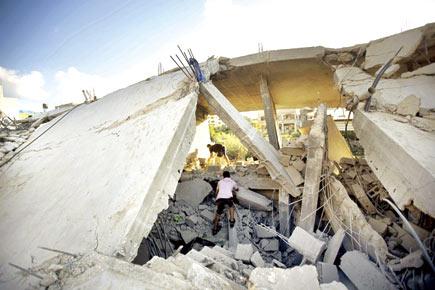
The Chabad House at Anjuna in Goa has a connection with the one in Mumbai which was attacked during 26/11. The rabbis at both the houses were brothers, and one of them was killed in the Mumbai terror attack.
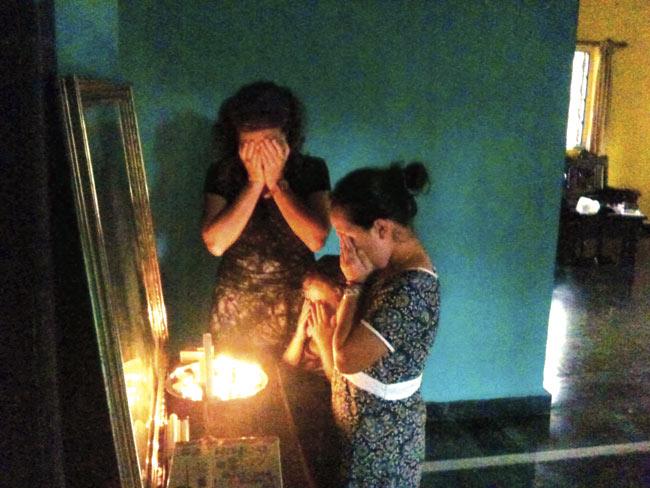
A strong Goa presence
ADVERTISEMENT
“We opened up Chabad in Goa to continue the work of rabbi Gavriel Noach, my brother, and his wife Rivka who were murdered in their Chabad House in Mumbai. This is our answer to terror, fighting darkness by adding light of goodness and kindness,” Moshe Holtzberg, the brother, says in an email communique.
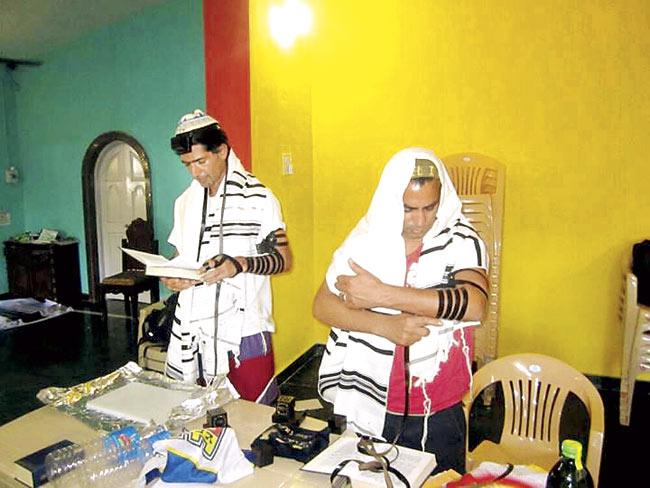
A glimpse of a ceremony inside the house
The season he talks about is the tourist season in Goa, which goes from October-May, when a large number of Israelis visit the sunshine state. Most of them come to enjoy the balmy weather in Goa and to also party hard, because of which, they at times, end up on the wrong side of the law or get drawn into criminal networks like the Goa drug mafia.
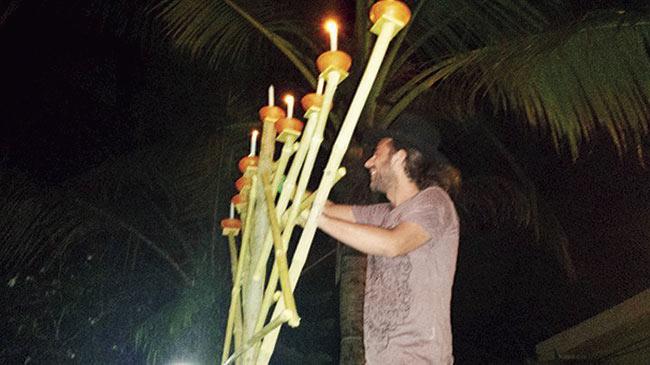
Fighting darkness with light Pics/Moshe Holtzberg
They are surely one of the more enigmatic foreign communities which have made Goa their home away from home. Say “Israeli”, and the first thing which crosses anyone’s mind in Goa is ‘drugs’ or ‘drug mafia’. An impression that gets reinforced periodically when some Israelis make the headlines for all the wrong reasons.
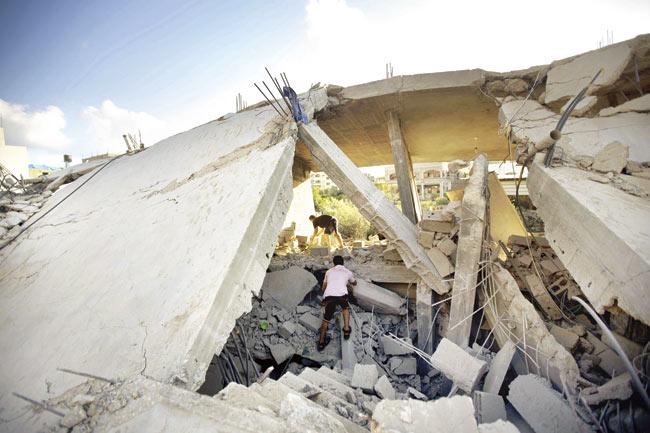
Palestinian men inspect a destroyed building following an Israeli military strike on Beit Lahya, northern Gaza Strip on July 15, 2014. Pic/AFP
It happened once again in June when two Israelis, Abronevel Paz and Minashe Sasson, arrested for possessing narcotic drugs, tried to escape from a court room where their hearing was going on. But policemen chased and managed to catch them.
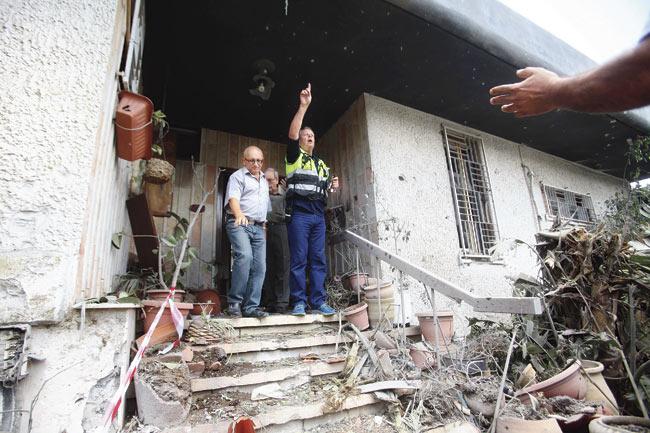
Israeli bomb disposal experts and civilians inspect damages after a rocket fired by Palestinian militants from the Gaza Strip hit a yard outside a house in Ashdod. Pic/AFP
Keeping a low profile
Most Israelis, though, keep a very low profile, sticking to their community members in coastal beach areas like Anjuna, Vagator, and Morjim. Most large groups of foreigners in Goa tend to stick together because of factors like language and food. It is the same with Israelis who speak Hebrew.
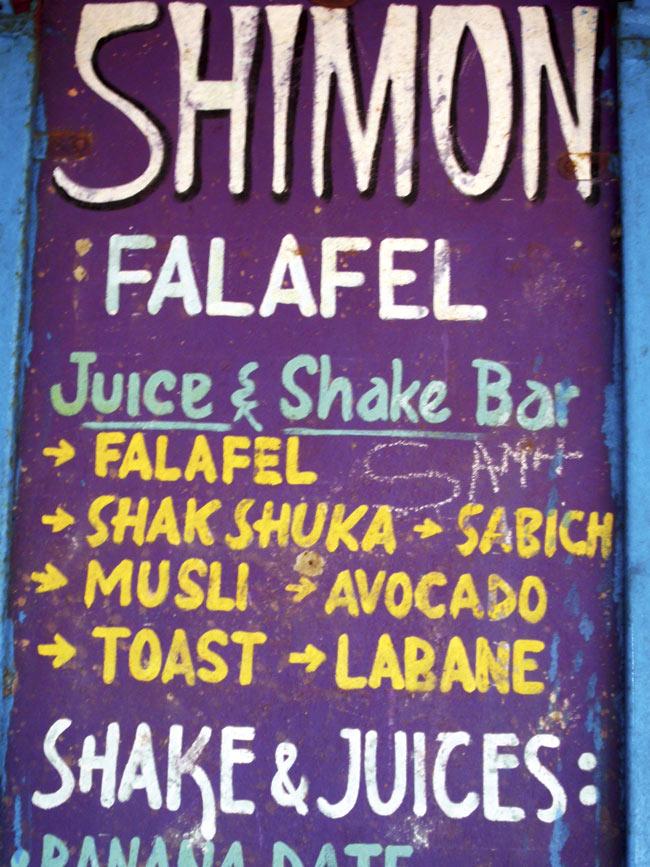
A menu outside a small cafe in Arambol offering Israeli food
“What attracts Israelis mainly, is that India is unlike the West. It is peaceful and calm; the culture that you don’t need to run to be on time or to be attached to your smart-phone gadgets. This, along with the magnificent views that God has gifted India makes it an attractive place,” says Moshe Holtzberg.
“Israelis also come to India after military service to relax. Being in the army and to experience terrorists trying to blow themselves up makes it quite stressful to live in a country that is constantly under terror attack,” he says about the reasons why they come here.
Holtzberg comes to Goa every season to serve as a guide for what could be termed as the misguided flock. The Chabad House is at Anjuna, centre of the rave-trance party scene in Goa. “It is a home of goodness and kindness.
We serve kosher food, we provide hospital and jail visitation, people come and study Torah and Chassidut (in-depth Jewish Kabbalah) here. People can be in contact with family via email or phone; it's a home away from home,” he says.
“We are working with the Indian government to provide security and I want to take this opportunity on behalf of the Holtzberg family to thank the police all over India and especially in Goa for providing us with security,” he adds.
“Also, I would like to tell you that the Holtzberg family with the help of Chabad International will be having the opening ceremony of the Chabad House in Mumbai, in the end of August this year.
Now Baby Moshe’s home will once again be standing strong. The Holtzberg family wishes to thank all those who helped in rebuilding, especially rabbis Moshe Kotlarski, Yosef Chaim Kantor, Chaim Eliezer Ashkenazi and Mrs Koslovski and George Rohr.”
Cat and mouse game
While there are the good Israelis, there are also some who are the bad guys, and find themselves on the wrong side of the law. A few, it would appear, are in a cat-and-mouse game with the Goa police.
In recent years, two of the most high-profile drug cases in Goa involved two Israelis, Atala Benahim and Dudu Driham, and a number of Goan policemen who were apparently in league with the alleged Israeli drug peddlers.
In one of the most embarrassing incidents involving the Goa police, drugs (charas) which had been seized over the years by the police and stored in their custody, were found missing, and were allegedly sold to Israeli and local drug peddlers.
Harassed by the police (Atala was finally extradited from Peru after fleeing India), Dudu, who had been caught with a cocktail of drugs, alleged that he had been framed by the police. His girlfriend produced a ‘sting’ video which showed policemen offering drugs to her and others.
Atala’s ex-girlfriend posted a video on Youtube which showed Atala boasting of his connections with police and even a minister. Embarrassed by the revelations, the Goa government suspended and arrested around a dozen policemen, including a police inspector, for their nexus with the Israelis. The cases are now dragging on in the courts.
A beachside restaurant manager who plays host to a large number of Israelis, says, “They usually come down from Manali in November and December when it's peak party season in Goa. In Manali, they join hands with local growers of charas, and apparently plant hybrid varieties of cannabis which give good and more potent yields.
They also use hi-tech farming techniques. The intertwining of drugs and spirituality, at least on the surface, in India also attracts a lot of these Israelis and other foreigners, who even become ‘Shiva bhakts’. Everybody says “Boom Shiva!” when they smoke a ‘chillum’.
Good happenings though
It is not all bad though. One of the side benefits of the Israeli presence in Goa is that you get authentic ‘shawarma’ at some Israeli-run outlets in the northern beach belt, while other Israeli dishes like 'chicken schnitzel' (fried chicken with pita bread and chips) also feature on the menus of many popular beachside restaurants.
With Goa in the news back in Israel, there have been other spin-offs, too, with industrialists and others visiting Goa and offering expertise for collaborations.
The latest was a proposal to set up a tourism college in Goa, besides offers to share knowledge in agriculture and dairy farming, how to attract high-end tourists and also how to develop hinterland tourism by using large community farms as an attraction.
A delegation led by Israeli consul in Mumbai, Jonathan Miller had visited Goa last year, and had an interaction with members of the Goa Chamber of Commerce and Industry (GCCI), following which a Goan delegation led by Manguirish Raikar, a former president of the GCCI, had visited Israel for a first-hand experience. “We stayed in a kibbutz and saw how they promote rural tourism.
Whatever is there the art, craft, fruits, in the village they will promote. We have started working on similar lines in Goa, where villagers in rural areas build rooms with modern facilities next to their houses which they can give for tourists. Whatever local produce is there can be used to produce food,” says Raikar.
Farming techniques
However, Raikar says progress has been slow in areas like dairy farming. “Goa being a small place, we don't have large farms. For the dairy farming project, they wanted a minimum of 1,000 cows.
Now where in Goa will you get that kind of number? So we have suggested we start on a smaller scale, with around 300-400 cows,” he says. Some of the other proposals are also facing similar bottlenecks.
When contacted, a representative of Israel’s biggest dairy technology promoters AlefBet, Daphna Regev, said, “After visiting Goa, we kept contact with Goa officials and we have very good connections with the Chamber of Commerce. An Israeli delegation went there this year to promote such projects, but until now nothing operative happened.
We strongly believe that we have the know-how and the experience and abilities to provide all needed design to upgrade existing villages or establish new villages, including housing, health facilities, education, public buildings, agriculture and post harvest facilities.
We do it worldwide and the success is huge. Maybe the problem is lack of funds for such integrative projects. We hope there would be real progress in Goa for the benefit of all.”
A rocky relationship
On the other hand, the church in Goa has not taken too kindly to the presence of the Jewish Israelis. The antipathy of the Catholic church towards Jews is well-known, and the sentiment is apparently reciprocated.
In Goa, the church's ‘social work’ wing, the Council for Social Justice and Peace, went so far as to publish a damning indictment of the Israeli presence in Goa.
Titled ‘Claiming the Right to Say No: A Study of Israeli Tourist Behaviour and Patterns in Goa’, the book was a compilation of 11 essays which dwelled with on the “unbecoming behaviour incompatible with local beliefs and customs including drug trafficking, prostitution, raves, and other crimes.”
The book was released by the Archbishop of Goa, and is the only book of its type to single out a foreign community for criticism, one of the main arguments being that the Israelis tend to only mingle with other Israelis, patronizing only Israeli establishments, and so on.
One article, by a senior priest, Fr Victor Ferrao, for example, says, “Their motivation, expectations, travel patterns and activities have little to offer to the local communities. This results in a substantial displacement of the locals.”
We want more tourism
Most Goans, though, did not take this publication seriously, even though it probably coloured some people’'s perceptions of the Israelis, and with many Goans involved in tourism, the government and private players continue to hope for more tourists from Israel.
Pamela Mascarenhas, deputy director, Department of Tourism, Goa, says, “We welcome the expertise offered by the Israelis in developing eco-tourism and agri-tourism in Goa. We hope that tourism boards of Israel and Goa mutually benefit from this process.”
Israel is also a destination for a large number of Christian Goans, who visit what is known as the holy land for pilgrimages to the sites where Jesus spent his life, many of which are in Israel. What do you make of all this? Not quite the brotherhood of man. It is probably too much to expect some of these battles to ever end.
 Subscribe today by clicking the link and stay updated with the latest news!" Click here!
Subscribe today by clicking the link and stay updated with the latest news!" Click here!







